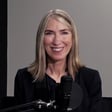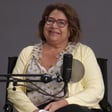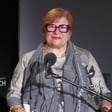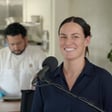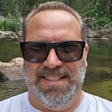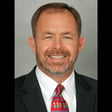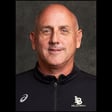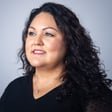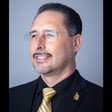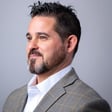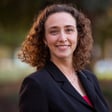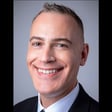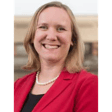Become a Creator today!Start creating today - Share your story with the world!
Start for free
00:00:00
00:00:01

Keeping the campus community healthy
Dr. Kimberly Fodran, chief of Medical Staff at CSULB Student Health Services discusses how the Center’s staff helps to keep the campus community healthy.
Transcript
Introduction to 'At the Beach' Podcast
00:00:16
Speaker
Welcome back to you At the Beach, the official podcast of Cal State Long Beach. I'm your host, Dan Montoya, Vice President of University Relations and Development.
Meet Dr. Kimberly Fadren
00:00:26
Speaker
Today, I'm honored to speak with the beach's very own doc,
00:00:30
Speaker
Dr. Kimberly Fadren. She's the Chief of Medical Staff at CSULB's Student Health Services and also serves as a team physician for Beach Athletics.
00:00:41
Speaker
Dr. Fadren earned her medical degree from Temple University School of Medicine, completed her residency in family medicine at Honor Health Medical Center in Scottsdale, Arizona, and went on to complete a fellowship in primary care sports medicine.
00:00:59
Speaker
She's a member of the American Medical Society for Sports Medicine, the American College of Sports Medicine, and the American Academy of Family Physicians. If you haven't had the opportunity to connect with Student Health Services, you should know it plays a vital role at the beach, serving nearly 40,000 students both on campus and virtually.
00:01:24
Speaker
Kim, welcome to the show. Thank you very much, Dan. So we're going have a simple conversation, and I'm going to ask you some questions, and we'll just have a great conversation about the beach.
00:01:36
Speaker
ah We may go off script, but it's all good. Sounds great. All right.
Dr. Fadren's Medical Career Journey
00:01:41
Speaker
So let's start with you. For those who may not know you, can you share your journey to becoming a medical director of student health services at the beach, and what does your typical day look like?
00:01:51
Speaker
Yeah, so I'm a Southern California native, born and raised here. A little bit nontraditional. After college, I took a big five-year gap wow to figure out what I wanted to do. i did some research, then went to medical school, residency, and um I moved here to Long Beach.
00:02:10
Speaker
And I just applied here to Cal State Long Beach on a whim and started here just working very part-time. Went back, did a sports medicine fellowship. Okay. ah Started here three days a week and then became full-time.
00:02:24
Speaker
Wow, that's awesome. Yeah, so it's it's been really wonderful working here. I love working with the students and my day-to-day, some clinical and a lot of admin as a medical director here. Yeah.
00:02:37
Speaker
How many years do you have already Cal State Long Beach? Ooh, if I include the per diem years, probably close to 14. Wow, that's great. So you've seen the campus evolve and change quite a bit.
00:02:49
Speaker
Yeah, yeah. It's actually more than that. um I started, let me correct that, um I think it's closer to 17. seventeen wow that's great. Yeah, because I started here right after one of my kids was born. Nice.
00:03:03
Speaker
Yeah.
Why is Student Health Important?
00:03:04
Speaker
Well, good. Well, so student health plays such a critical role in academic success and campus well-being, right? Why is prioritizing student health so essential and how does your team advance the mission here at the beach?
00:03:19
Speaker
Yeah, that's ah that's a great question. um So health, I think, is a really broad term, and there are lots of areas other than physical health. So obviously, we focus primarily on physical health, um but it's important to recognize the interplay of the other realms. so So um we have departments that support um mental health. We have a case manager on site.
00:03:42
Speaker
We also have our office in Wilson Health Promotion that work on things like stress management, sleep hygiene, and all those other things that are really important to, you know, physical as well as mental well-being and just being a good student and doing well here.
00:03:57
Speaker
right So when we when we talk about students, um what what are like the top three things that students struggle with on the mental health side most?
Mental Health Challenges Facing Students
00:04:10
Speaker
That's a big question. um I mean, I think the run-of-the-mill things like anxiety and depression, um but it's also things like how to navigate the university system, where it to turn when you get in trouble academically. And I think...
00:04:28
Speaker
Students sometimes have a hard time figuring out where to go and where to turn. and so oftentimes we see students for a cough, cold, ankle sprain, but there's several layers to every one. Absolutely. so Yeah.
00:04:42
Speaker
And i'm I'm asking for a friend because I'm just kidding. My son is is transferring here. and He's actually going to study engineering. So um i i I'm a student myself as a parent. You know how that works.
00:04:54
Speaker
Yeah. So congratulations to your son. Yeah. We're happy to
Future Goals for CSULB Health Services
00:04:58
Speaker
have him. And yeah, our goal here really is to treat students holistically. Right. Good. and and you And you guys do a real good job. So kudos to you. I hear out nothing but great things coming out of your office. so well Thank you.
00:05:10
Speaker
So looking at ahead at the academic year, what are your goals for student health services? So I think one of the main goals is outreach. I think, you know, kind of we're tucked here in a corner of campus.
00:05:22
Speaker
And I get it. Students have a lot of other competing priorities. But I think making sure that people know that they have access here right um is a really big one because we often see students their very last year or semester like, oh, we even know you guys were here.
00:05:38
Speaker
So I think that's one of the main priorities, um expanding and strengthening in our services, hiring another clinician, um especially for things like transgender care. We have an increasing number of eating disorder um students or students with eating disorders, I should say, or disordered eating. Right.
00:05:57
Speaker
So um getting a clinician with that type of level of expertise is important. And then eventually we want to um hopefully expand and include dental services as well. Wow. that Dental is so important. And yeah a lot of students don't think about that until they actually have to get treated, right? Right.
00:06:14
Speaker
Can you maybe share a little bit about the different services
Available Health Services at CSULB
00:06:18
Speaker
that are here? Because I think, like you said, people pass by it all the time, right? You're kind of like the library you are or the other. ah There's a couple other areas on campus that you career services that people don't go until they actually actually need them.
00:06:33
Speaker
Right. um So, yeah. If I was a student and I said, well, what, you know, if I had certain things, what could I get treated for at the Student Health Services? Yeah, so it's a lot more than coughs and colds and and STD checks. um We have on staff a psychiatrist, a gynecologist, two sports medicine physicians. um We have x-ray, we have a pharmacy here, and then all of our health promotion things that's pregnancy testing, it's counseling. We also offer in-house ah CAPS counselors that are housed here. So it really facilitates working well between the clinicians and um the mental health side as well. Wow. That's that's quite a bit. and how big is your staff?
00:07:20
Speaker
It's pretty big. I'm going to refer to my notes for a second, but we have six physicians and then four mid-level providers and then three other part-time practitioners, and then we're looking to order and looking to hire another one. Wow.
00:07:32
Speaker
Yeah.
Integrating Physical and Mental Health
00:07:33
Speaker
That's amazing. um So balancing the physical needs with the growing demands of mental health, how does your team integrate the two areas effectively?
00:07:43
Speaker
Yeah. So as you alluded to, kind of see the two as inextricably intertwined. And so, as I mentioned, we have an in-house CAPS counselors.
00:07:54
Speaker
um They're CAPS, but they're housed here. And that really helps facilitate when there's a mental health issue. And then we also have an in-house behavioral health team. right In addition to our psychiatrist, we have a caseworker.
00:08:07
Speaker
And then a referral nurse to help facilitate if a student has insurance, needs access to an outside psychiatrist or a therapist. So um what what is covered in in the health care for a student? Like they they pay fees, right,
What Health Services are Covered?
00:08:24
Speaker
when they come here.
00:08:25
Speaker
What is covered and what is not covered? it And I'm asking for myself. Asking for a friend? Asking for a friend. Yeah, it's a lot. ah I think from a student perspective, it's pretty amazing, I think, being ah an adult now and seeing how insurance and all that works.
00:08:41
Speaker
So it basically covers all the visits. You have access to all those types of physicians and services that I mentioned um all the time, as many times as you want. There's no copay or any fees for that.
00:08:55
Speaker
X-rays are free. and We routinely provide um orthopedic devices. So let's say you sprain your ankle and you need anything from an ace wrap to a walking boot.
00:09:05
Speaker
That's all covered. um X-rays are free. The only thing that students pay for are some labs and then um medications and everything is at cost.
00:09:16
Speaker
Wow. That's great. Wonderful. and And can staff use it as well? ah Staff can't be our physicians, but you can use our pharmacy. Okay. Well, I just wanted to clarify that because somebody who's listening in in here with a staff and be like, hey, I'm going to go if I need something. But hey, the pharmacy, when you get cold ah cold or something, you pick up medicine or allergy stuff.
00:09:38
Speaker
And it's way less expensive than it would be at a regular pharmacy. Target, Walgreens, it's really inexpensive. That's great.
Reflections on COVID-19 and Other Health Concerns
00:09:45
Speaker
Yeah. Yeah. So you were here at a time where COVID was here.
00:09:51
Speaker
um To manage that is to say that you have navigated a monstrous thing because it was a global pandemic, right?
00:10:04
Speaker
How did your team manage that and what did you learn So, I mean, it wasn't just my team. I think it was a lift of the entire university. I mean, it was working with you and the entire executive team and so many different areas of campus. um I think one of the silver linings of the pandemic is that it gave us the opportunity to work with so many different areas.
00:10:28
Speaker
And it just gave me a glimpse on how important it is to collaborate within the university and to work together. That's great. um COVID hasn't gone away.
00:10:39
Speaker
ah No, it's gotten much better, though. Still lingering, right? Still lingering. so So is there any strains that that you're hearing about? or I mean, I know a friend of mine went on travel and came back and they got COVID.
00:10:53
Speaker
what what What do you know? So if public health isn't worried about it, I'm not so worried about it. um Yes, there are new and emerging sprain strains, just like with flu and any other virus that tends to mutate.
00:11:08
Speaker
um But I think we're in a so much of a better place than we were previously. So I think a bigger concern, um a immediate concern might be measles.
00:11:20
Speaker
So that that's something that we're on the lookout for. Yeah. So and is that a requirement for all the students to have that shot? um Unless there's a medical exemption, then yes.
00:11:31
Speaker
Okay. Yeah. All right. Yeah. And any other vaccinations that students should pay attention to?
Addressing Diverse Health Needs
00:11:39
Speaker
I would say if they're going to pay attention to any of them, I would focus on measles. Flu is helpful during the flu season um because I think last flu season was many more cases than we expected here in student health.
00:11:53
Speaker
um So measles would be the really big one and the one that we're preparing for with public health if there is a case on campus. That's good. So you you mentioned a couple of diverse groups in and in our previous comments.
00:12:11
Speaker
Regardless of background or circumstances, how do you meet their needs? How do they meet ah the needs of a campus who has so many different students from different backgrounds, needs?
00:12:23
Speaker
How do you meet them where they're at? Because that's a tall order. Yeah, I mean, I think it is a tall order, but it's also such a privilege working here on a college campus and being able to interact with such a diverse group of students. I mean, I think it's just being aware of the unique needs of each individual and person. Right.
00:12:43
Speaker
And just as a clinician trying to gauge what it is that they need outside of actually sometimes what they come in for. right It's not uncommon that, you know, you come in someone comes in for something for me because I'm sports medicine, musculoskeletal, and it turns into completely something else.
00:13:01
Speaker
So I think it's being able to be a good listener and to be able to connect the students with the resources that they need and the support that they need to be successful here.
00:13:11
Speaker
That's great. Yeah, well said.
Challenges in Staffing and Resources
00:13:13
Speaker
um So what challenges do you face here at the center? Staffing or, you know, equipment or what what things do you what challenges do you face?
00:13:27
Speaker
I mean, I think in terms of a clinic, um we're actually pretty fortunate when compared to other CSU campuses. I think the challenges perhaps tend to be more on a CSU-wide basis yeah where other smaller campuses or other campuses that are less resourced tendant to run tend to run into a little bit of trouble.
00:13:47
Speaker
um But we have you know partnered with them and offered you know services and kind of sent our staff over to help them out as well.
Promoting Health Service Awareness
00:13:55
Speaker
That's great. yeah And so how how does student how do you get students to become more aware of what you have here and all the great people that work here?
00:14:04
Speaker
I know you probably table at the beginning of school. and yeah and But throughout the year, how do you how do you keep trying to reach students to say, we're here? Yeah, so our team through the Office of Wellness and Health Promotion have been great.
00:14:17
Speaker
So they do various events and festivals and fairs and go to different departments. um We're also part of the Student Health Advisory Council, so it's a group of students that advise us.
00:14:31
Speaker
um We have student advocates that are out on campus. And then actually it's word of mouth. Okay. So students will come in and they'll talk about the experience that they had, the services they offer, and then they're referring their friends and roommates. And those are our favorite type of ways that people learn about us. That's good.
Current Healthcare Trends
00:14:52
Speaker
what What about trends? What trends do you see in the healthcare care field coming down the pike? Things that we should pay attention to or or even even with staff, you know, and not just students, but faculty, like what what things are you seeing that's impacting these communities?
00:15:10
Speaker
Yeah. I mean, I think coming off of the pandemic, um people pay a lot more attention to infectious disease. Right. So measles, as I mentioned previously, because it's so contagious and because you can have some sequelae that are really concerning if you get measles as an adult and because it spreads so easily. Right.
00:15:30
Speaker
um I think knowing your vaccine status for that for campus is going to be a big one. um One that we are working on that I mentioned previously is eating disorders. And I don't think it's necessarily there's an increased prevalence, but perhaps increased awareness. And the fact that we offer those services here has been tremendously helpful, but also an area of need that we've mentioned. Great.
00:15:54
Speaker
Great. How do you partner with folks outside of the university? Do you have connections with other ah hospitals or clinics?
Collaboration with Local Hospitals
00:16:06
Speaker
Yeah. um So we work with Long Beach Memorial. yeah So are their family medicine residents rotate through here, and we do some teaching as well. So that's been a great partnership. They help us with transgender and also reproductive health.
00:16:21
Speaker
So if there's things that students need that we're not able to provide, they help us with some of the surgical aspects. um And when students graduate, some of our transgender students transfer their care over to their residency program. Okay.
00:16:36
Speaker
With St. Mary's, and we partner with them for breast health. So if someone needs a mammogram, we are able to refer them to St. Mary's and they can get it there for free the majority of the time.
00:16:47
Speaker
And then mental health partners. And then, of course, Long Beach Public Health. So Long Beach Public Health has been amazing in terms of helping with the pandemic, helping with, you know, STI testing and education. And yeah, we're very, very fortunate to have them.
00:17:03
Speaker
That's awesome.
Dr. Fadren and CSULB Athletics
00:17:05
Speaker
Talk to me a little bit about your work with athletics. You're working with athletes. how How's that? That has been super fun and amazing.
00:17:14
Speaker
So love the athletics department. um I don't get to do nearly as much as I would like to in my current role, um but I do help out with um coverage at meets or games or in the training room or when student athletes come here and need to be seen, coordinating with the athletic trainers and all the different things that's that are needed when you're working with student athletes.
00:17:41
Speaker
Yeah. And they' and they're a very unique population, right? Because, they you know, they come into you like as fit as can be and then they they go down and then you have to probably create a plan to get them back up and running again, right?
00:17:52
Speaker
Yeah. And it's a close collaboration with us and the team of athletics, which has been amazing. Good. So um how can alumni, friends and community partners continue to support ah student health services and the next generation of the beach?
Supporting Student Health Services
00:18:10
Speaker
Yeah, I think um just maybe increasing awareness and letting people know that we're here. um and then we're always looking for community partners. And if anyone is looking to support us, right that would be amazing. Yeah, I agree. ah Philanthropically, there's always an opportunity for support because it really benefits the students. I think when when we think about parents...
00:18:34
Speaker
And we ask them, what do you want from your time or your students' time here at the beach? Well, they say, I want them to be healthy, have a good experience, and get a job.
00:18:45
Speaker
Those are the most important things, right? Safety and a good experience and then yeah workforce. So um i I think if anybody's listening or interested in helping this community, I think it'd be a great opportunity to support your center.
00:18:59
Speaker
So um what are some... simple things that they could support? You you have a fund with the Student Health Services Center, or how can they make a contribution? Other than contacting you. Okay, yeah. um I think one of the bigger needs is we have a significant number of students who are food insecure, housing insecure, and if they need to see a specialist or pay for an ambulance to the ER or get advanced imaging like MRIs or CTs,
00:19:30
Speaker
um I think that stuff is really difficult. yeah So if they want to contribute to students who are underfunded, underinsured, um uninsured, that would be incredibly helpful.
00:19:43
Speaker
Yeah, i think that's so important because a lot of times, you know, that's debt. that That's on top of whatever other expenses they have that they'll have to cover in the future. yeah And sometimes either they can't afford it or their families can't afford it.
00:19:56
Speaker
Yeah, and it's hard because, you know, as a clinician, you want to tell someone, I think you need to go to the ER, but sometimes a student doesn't want to go because they're afraid they can't afford it, which is heartbreaking. Yeah.
00:20:07
Speaker
So let's ah let's dive a little deeper about
Dr. Fadren's Path to Medicine
00:20:11
Speaker
you. you know how How did you know that you wanted to do this as a career? ah In short, I didn't. Yeah.
00:20:19
Speaker
No. um Was there something that inspired you or yeah someone or and our ah something that happened to you that you're like, hey, I want to make a difference in people? Yeah. So um I think both of my parents are are x-ray tech, so was exposed to the field.
00:20:37
Speaker
um I went to college thinking I would do something in the medical field. And I think, you know, the aspiration for a lot of people is like, oh, I want to be a doctor. um And then I took my first chemistry class and I didn't do well. And then I said, no, I'm not going to be a doctor.
00:20:53
Speaker
um I was political science for a while. I went down the lawyer route. I got bored. And then ah decided to get back into medicine. i thought maybe I would do research. ah Didn't like sitting behind a bench and not talking to people.
00:21:10
Speaker
and so just trying to use, you know, whatever gifts and talents and skills I have to make a difference. That's awesome. And so what keeps you motivated and inspired to do the work that you do?
Motivation and Work at CSULB
00:21:23
Speaker
um I think it's the students here. the staff here are really wonderful and I love them and love working with them. But um being able to help students on an individual basis has been just incredibly rewarding.
00:21:38
Speaker
That's great. So before we wrap up, is there anything else that you would like to our audience to know about either yourself or the center or anything that you think is very critical and important for you to to say?
Encouragement to Utilize Health Services
00:21:55
Speaker
Yeah, for those of you that haven't taken advantage of student health services and what we offer, i would encourage you to please stop by. We're a lot more than passing out Band-Aids and doing an STI checks.
00:22:10
Speaker
um And then just to make the most of your time here and to really explore everything the university has to offer. There are people here that support and care about you, not just on a physical sense, but you as a person, it's okay to ask for help.
00:22:27
Speaker
And if you don't know where to go and you're a student here, you can um please stop here and we can help you. Yeah, I 100% agree. I think Cal State Long Beach is a very special place.
00:22:38
Speaker
Because I think if you walked into any office as a student and asked for help, they would help you. Yeah. So it's really great.
Conclusion and Call for Engagement
00:22:44
Speaker
Well, thank you for being with us today. I really enjoyed our conversation. And as usual, i learned so much from you and your team. and And I worked with many of you. So you have an amazing team. Keep doing the great work that you do.
00:22:56
Speaker
A big thank you to my team, Sully and Jeff, continuing to do great work. This is our second show on on video. And so we we look forward to continuing to take you to different parts of campus. And so we appreciate you. Again, I'm Dan Montoya, Vice President for University Relations and Development.
00:23:14
Speaker
And this is At the Beach. And we always like to finish our podcast with a Go Beach on three. One, two, three. Go Beach. Beach.
